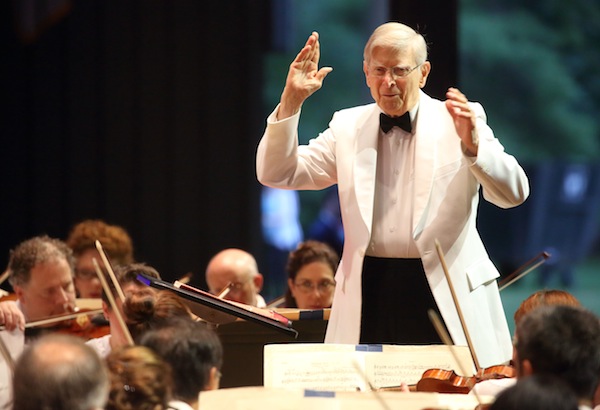Blomstedt, BSO deliver captivating Mozart, Haydn and Bernstein at Tanglewood

Herbert Blomstedt conducted the Boston Symphony Orchestra Saturday night at Tanglewood. Photo: Hilary Scott
Herbert Blomstedt, the nonagenarian maestro and Springfield, Massachusetts native, wrapped up his 2018 Tanglewood residency with a program Saturday night that belied both his age and expected repertoire.
The former shouldn’t be a surprise for anyone who heard Blomstedt’s vital Mozart concerts with the Boston Symphony Orchestra at Symphony Hall in February.
Nor should the latter, given the conductor’s dynamic podium manner and the clarity of his interpretive thinking: here is a musician still very much at the top of his game, having just turned 91 earlier this month. Saturday’s performance with the BSO demonstrated just that, pairing limber, galvanic accounts of music by Mozart and Haydn with a captivating performance of Leonard Bernstein’s flute-and-orchestra nocturne, Halil.
In the Classical-era selections, vigor and grace were the names of the game. Blomstedt ably drew out the ebullient playfulness in the outer movements of Mozart’s Symphony no. 34, which opened the program. Throughout, rhythms were taut, colors bright, and the BSO’s attention to the score’s dynamic extremes gave this reading a welcome intensity.
So did Blomstedt’s strong sense of forward momentum, which was most evident in the orchestra’s brisk – but still graceful and serenely lyrical – account of the slow middle movement.
Haydn’s D-minor Lord Nelson Mass, which closed the evening, exhibited many of the same qualities.
Written in 1798, the origin of the Mass’s sobriquet remains obscure, though it probably dates from sometime between the piece’s premiere (about a week after news of Nelson’s momentous victory over the French at the Battle of the Nile reached Haydn at Eisenstadt) and its performance two years later for Nelson himself, as the admiral passed through on his way to England. Regardless, the Missa in angustiis stands as one of Haydn’s most tightly constructed and emotionally direct liturgical settings.
Saturday’s performance was crisp and athletic, brimming with drama, especially in Haydn’s stern, minor-key writing in the Kyrie and during the martial tattoos of the Benedictus.
The Tanglewood Festival Chorus, prepared by James Burton, delivered their parts superbly, singing with rounded warmth, excellent diction, and unanimity of articulation. Particularly impressive were the score’s contrapuntal moments—the “In gloria Dei Patris” was brilliantly robust as was the singers’ stylish realization of the dynamic contrasts in the Sanctus and Agnus Dei.
The vocal quartet was well balanced and tonally luminous as rendered by soprano Hannah Morrison, mezzo-soprano Elisabeth Kulman, tenor Nicholas Phan, and baritone Michael Nagy.
In between these two 18th-century scores came Bernstein’s Halil.
Written in 1981 as a memorial to the Israeli flutist Yadin Tenenbaum, who was killed during the Yom Kippur War in 1973, Halil is one of Bernstein’s most sophisticated and expressively potent late works.
The piece begins with a section of angular 12-tone writing that gradually softens into a lush but still harmonically ambiguous diatonic melody. A vigorous dancing section follows before a substantial cadenza pits the solo flute against an array of percussion instruments. After the cadenza peters out, the diatonic tune returns in the orchestra, but the soloist remains silent until almost the end of the work, joining in just before the final cadence.
Saturday’s soloist was the BSO’s outstanding principal flute, Elizabeth Rowe. She tackled Bernstein’s fiercely virtuosic writing with aplomb, playing Halil’s peculiar mix of sumptuous melodies, quarter-tones, fragmented motives, and skittering glissandos with golden tone and fiery personality.
Blomstedt is not a conductor one would ever associate with Bernstein’s music, but he proved a sympathetic advocate of his near-contemporary. His reading of Halil was a mite more spacious than Andris Nelsons’ last fall, but it was full of character, unfailingly songful, and bristling with energy.
Thomas Adès, Christian Tetzlaff and the Boston Symphony Orchestra perform music of Adès and Sibelius 2:30 p.m. Sunday at Tanglewood. bso.org; 888-266-1200
Posted in Performances